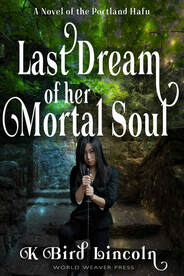 Guest Post by K. Bird Lincoln We’ve probably all experienced post-series depression after finishing a book or TV series. I actually went to bed and cried at the death of Showtime’s Robin Hood) And don’t even get me started on how I lived through the dark, dark times after finishing Robin McKinley’s Sunshine and realized she wasn’t a sequel-writing author. We throw our hands in the air and cry out “How can I be this upset over a fictional character!” There is a ton of research out there related to how reading forces us to create mental models of how other people think and act in order to predict actions. This can teach us empathy and whether the characters are Robin Hood, a 900-year-old Vampire, or Barack Obama—none of whom I’ve met in real life—if I spend time and mental effort imagining a person through a book or show, then I’ve created an emotional and cognitive bond with him or her. See Jason Tougaw’s handy article about The Reading Brain for a quick summary of three popular scientists studying cognitive load, mirror-neuron empathy, and how representations of art help us predict social relations. The post-series—postwritum—depression or hangover is worse when you’re an author. Based on a time metric alone, who in the world has spent more time with Constantine from Sunshine? A fan or Robin McKinley? Okay, maybe that’s not the best example because Sunshine is one of the few books I’ll reread and I’m pretty sure McKinley has moved on. As authors, we think about our characters for a long time before pen ever touches paper, or fingers ever touch a keyboard. There’s the rewrites and copy editing. And then there’s forgetting what color the parents’ eyes were so we have to go back and reread the first book for nitpicky details. 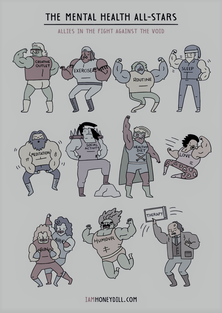 When that all ends and the last novel of the trilogy is finally toddling its way out into the world, the poor author’s brain is left with a void where, in the case of The Portland Hafu, Koi Pierce, Ken Fujiwara, and Kwaskwi used to be. The gang have lived in my brain since 2009. Strangely enough, the characters from the new work in progress didn’t move into that Portland Hafu space. It still feels empty. I came across an article by Jeanne Kisacky in Writer Unboxed that suggests recharacterizing post-project or “postwritum” depression as post-project recovery. As soon as I read her story of walking a line between drifting and deadlines, picking up old hobbies like knitting and hiking, I realized that authors and fans should stop judging ourselves for having feelings. For caring. Mourning is a natural process. Now I refer myself back to the mental health all-stars poster when I feel that sadness. I just don’t use writing as one of my coping mechanism. Instead I do yoga, bake chocolate cookies with marshmallows, and go on more walks with my coffee buddies. It helps to think of it as recovery because not only does it give me permission to have those empty feelings, but also frames it as something temporary instead of permanent loss. I’m sure at some point, but not now, I’ll crack open Last Dream of Her Mortal Soul and revisit those folks again. Meanwhile, you’ll have to excuse me, I have some downward dog and a Lavender Latte waiting for me. 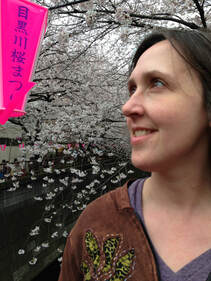 K. Bird Lincoln is an ESL professional and writer living on the windswept Minnesota Prairie sustained by family and frou-frou coffee. Also dark chocolate-- without which, the world is a howling void. Originally from Cleveland, she has spent a couple decades living on the fringes of the Pacific Ocean. Her speculative short stories are published in various online & paper publications such as Strange Horizons. Her medieval Japanese fantasy series, Tiger Lily, is available from Amazon. Her multi-cultural fantasy set in Portland, Oregon begins with the book Dream Eater. She also writes tasty speculative fiction reviews on Amazon and Goodreads. Check her out on Facebook, join her newsletter for chocolate and free stories, or stalk her online at kblincoln.wordpress.com
1 Comment
Rthlncln
3/21/2019 08:21:27 pm
Hopefully melon pan and Sakura will help a little.
Reply
Your comment will be posted after it is approved.
Leave a Reply. |
World Weaver PressPublishing fantasy, paranormal, and science fiction. Archives
February 2024
|
- Home
-
Books
-
All Books
>
- Beyond the Glass Slipper
- Bite Somebody
- Bite Somebody Else
- Black Pearl Dreaming
- Cassandra Complex
- Causality Loop
- Clockwork, Curses, and Coal
- Continuum
- Corvidae
- Cursed: Wickedly Fun Stories
- Dream Eater
- Equus
- Fae
- Falling of the Moon
- Far Orbit
- Far Orbit Apogee
- Fractured Days
- Frozen Fairy Tales
- Glass and Gardens: Solarpunk Summers
- Glass and Gardens: Solarpunk Winters
- Grandmother Paradox
- Grimm, Grit, and Gasoline
- Haunted Housewives
- Heir to the Lamp
- He Sees You When He's Creepin': Tales of Krampus
- Into the Moonless Night
- Jack Jetstark's Intergalactic Freakshow
- King of Ash and Bones (ebook)
- Krampusnacht
- Last Dream of Her Mortal Soul
- Meddlers of Moonshine
- Mothers of Enchantment
- Mrs Claus
- Multispecies Cities
- Murder in the Generative Kitchen
- Recognize Fascism
- Scarecrow
- Sirens
- Shards of History
- Shattered Fates
- Skull and Pestle
- Solarpunk (Translation)
- Solarpunk Creatures
- Solomon's Bell
- SonofaWitch!
- Speculative Story Bites
- Trenchcoats, Towers, and Trolls
- Weredog Whisperer
- Wolves and Witches
- Anthologies and Collections
- Novels
- Novellas
- Fairy Tale
- Fantasy
- Romance
- Science Fiction
- Urban/Contemporary Fantasy
- Young Adult SFF
-
All Books
>
- Blog
- About
- Contact
- Press / Publicity
- Newsletter Signup
- Privacy Policy
- Store

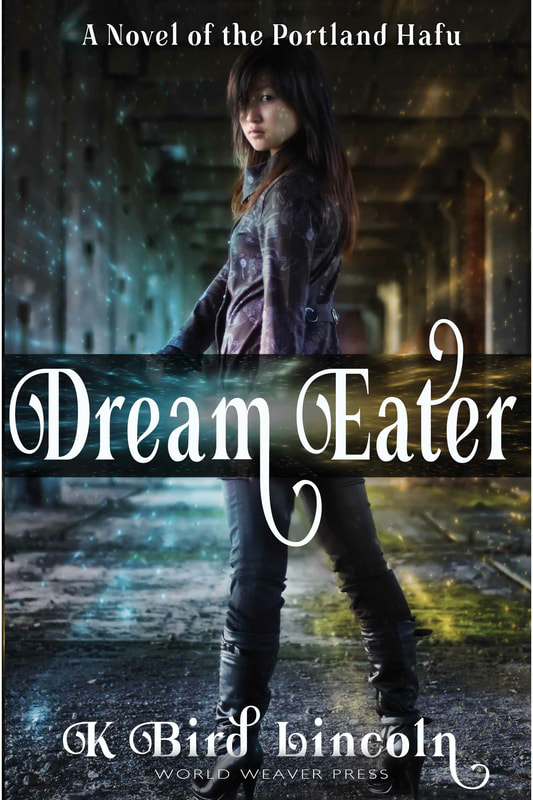
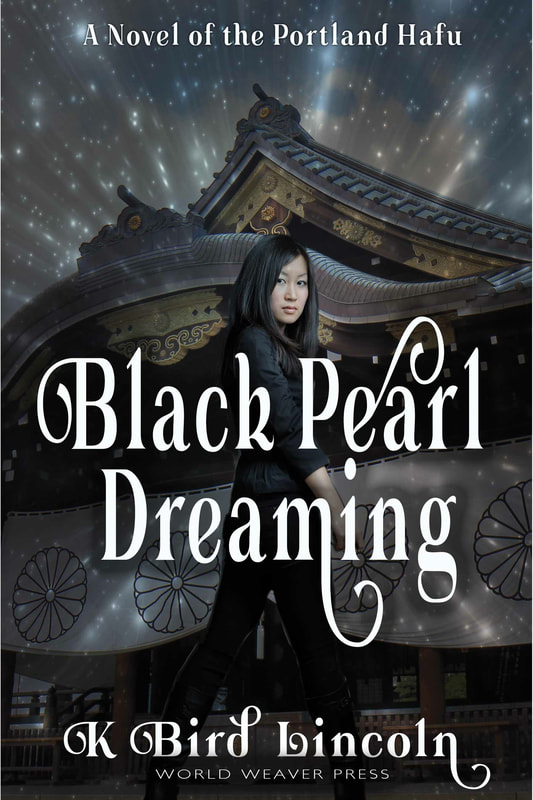
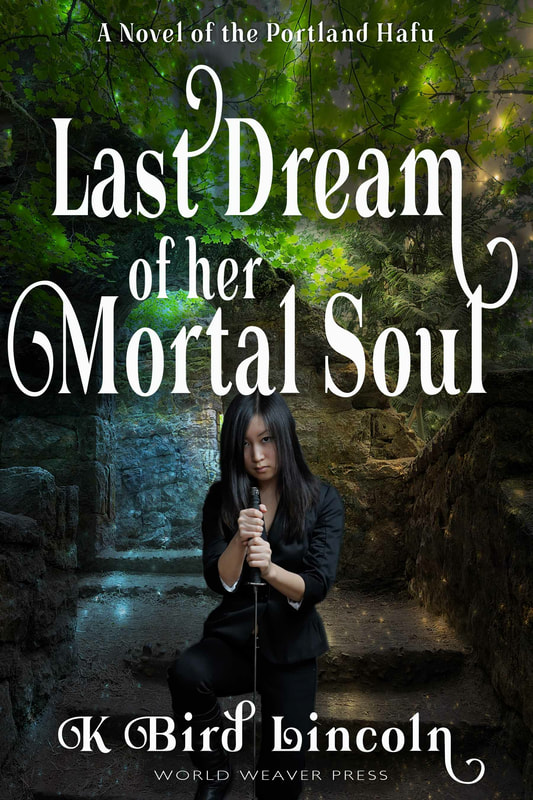
 RSS Feed
RSS Feed